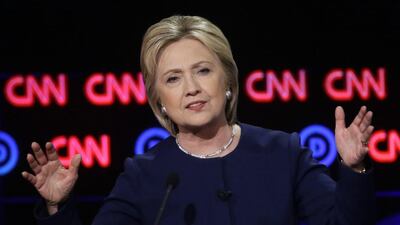Had you asked me last summer which candidates would carry the banner for the two major parties in the 2016 presidential election, my answer would have been simple: Jeb Bush and Hillary Clinton. I probably would have said Mr Bush would face some challenges from the right, but his financial advantage, governing experience and family brand would lead him to ultimate victory in the Republican primaries. On the Democratic side, I would have brushed off any prospect of a serious nomination battle. Mrs Clinton was, like Mr Bush, a known brand with decades’ worth of experience navigating the tumultuous politics of Washington, DC.
Going further, had you suggested that billionaire real estate mogul, Donald Trump, and Bernie Sanders, a self-identified democratic socialist senator from Vermont, would be serious contenders for their parties’ nominations this late in the game, I would have laughed at you and might have even suggested you were crazy. Well, it turns out I was the crazy one.
Few scholars of American politics were expecting such a storm of anti-establishment sentiment to rage on both sides of the aisle this primary season. Though Mr Trump and Mr Sanders have yet to clinch their parties’ nominations, the fact that we cannot say for sure what will happen at the end of the primary season poses serious problems for American domestic and foreign policy in the future. Should either Mr Trump or Mr Sanders win, we should expect no less than a fundamental shift in how America functions both at home and abroad.
While most commentators have focused on the domestic consequences of Mr Sanders’ tax proposals and Mr Trump’s immigration rhetoric, few have taken note of the potentially far-reaching consequences of each candidate’s foreign policies.
To be sure, candidates and political thinkers on both sides of the spectrum have taken aim at both candidates' lack of foreign policy experience and what it would mean for the world in general and the Middle East in particular. Mrs Clinton lashed out at Mr Sanders on the eve of the New Hampshire primary, lambasting his proposals, such as “inviting Iranian troops into Syria to try and resolve the conflict there. Putting them right on the doorstep of Israel”. Prominent neoconservative historian and intellectual architect of the Iraq war, Robert Kagan, lambasted Mr Trump and declared, “the only choice will be to vote for Hillary Clinton”.
These attacks aside, it would be foolish to assume that both Trump and Sanders’ lack of bona fides will lead either to lose. In an election increasingly defined by a grassroots insurgency on both sides, we must come to grips with the real possibility that one of these two could actually win in November. Given this fact, we must consider what the implications of such a win would be on the global stage. Put simply: what would a President Trump or a President Sanders mean for the United States’ role in the world? Let us consider these possibilities in turn.
Mr Trump has already made clear that he is much less inclined to confront Russia and its positions in the Middle East. While he opposes the Iran deal, he would not tear it up. These two factors, in conjunction with Mr Trump’s recent spat with Prince Alwaleed bin Talal, would suggest that Mr Trump would have an extraordinarily icy relationship with Saudi Arabia and, more broadly, the GCC. Such a deterioration of the United States’ long-standing relationship with the Gulf countries would create serious roadblocks in the continuing fight with ISIL, as well as the push to put an end to the bloody war in Syria.
On the Democratic side, while Mr Sanders’ rhetoric is certainly less vitriolic than Mr Trump’s, his relative silence on foreign policy matters is deafening. Moreover, his naivety in this field and complete lack of any comprehensive game plan is just as worrying as Mr Trump’s bombastic positions. Until late last month, Mr Sanders had not even bothered to assemble a foreign policy team. While some would like to give Mr Sanders a pass on this front, on account of his domestic-driven campaign message, the reality is simple: for better or worse, the United States is a dominant force in the world. For a major party candidate to lack any sort of concrete strategy for managing this global role is at best troubling.
There is one area of foreign policy that both Mr Trump and Mr Sanders have chosen to stake (strangely similar) positions on: international trade. Both candidates have attacked various aspects of free trade agreements and have been particularly critical of China. Should either candidate win, we should expect fierce battles over trade and, in all likelihood, a deterioration of relations between the United States and China.
On top of all of this, it is perhaps even more concerning that neither of these two upstarts has a set of concrete and committed allies in Congress. Since policymaking in the United States requires the joint assent of Congress and the presidency, how would two men be able to navigate the complexities of the legislative process?
While the future of this election is up in the air, it would be a grave error to avoid consideration of these critical issues. In the remaining months of the primary campaign, voters in both parties’ primaries should analyse these factors carefully and ask themselves a simple question: is dissatisfaction with your party establishment a sufficient reason to vote for a candidate who is totally unprepared to meet the challenges of contemporary foreign policy? For me, the answer is simple and succinct: no.
Adam Ramey is an assistant professor of political science at New York University Abu Dhabi

